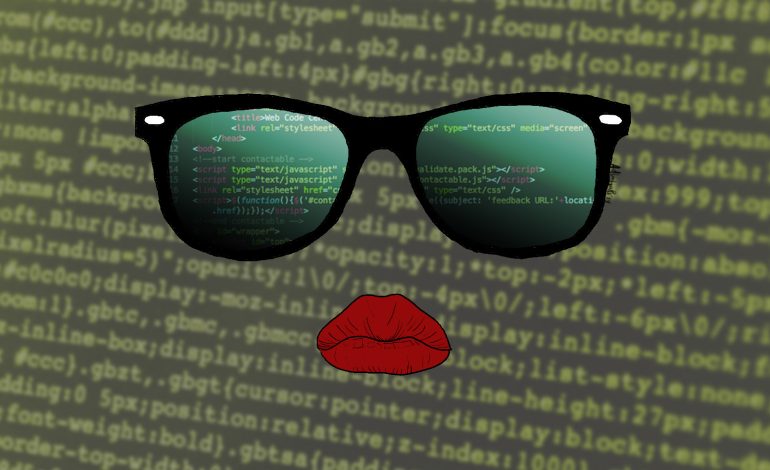Female Programmers, the Rare Species

How cool is female programmer? Super cool. Superbly awesome. Impressively stunning.
Maybe because female programmers are rare – as rare as female engineers.
Why is that?
Programming requires strictly logical thinking and tedious code crunching, cognitive process most women found intimidating on many levels. It is not about brain capacity or willingness that build the reluctance of women being programmers. The depth of cognitive process of a programmer obviously defines a “genre” or “personality” which mostly would not fit women in general.
Women tend to put too many consideration in decision making, while programming requires simple, to-the-point problem solving. While one of the strengths of women is the ability of paying attention to details, this appears to be the barrier for them to do programming too: they put attention into too much details so they forgot the central problem that is more essential than the details.
The nature of being a programmer that poses further challenge to women is the occupancy requirement. Programming is an addicting, engaging, uninterruptable, occupying activity. When you have this as a profession, it would be hard to manage time for other things, like taking care of family/kids.
Similar to programming, engineering is a strict discipline requiring a firm, robust and solid attitude of logical thinking. Girls usually choose “softer” disciplines like social, arts, or science, because these kind of field give them sufficient space and freedom to get along with their moods. And this kind of field usually has more female students than male students.
This is why some women are unable to cope with the challenges of being a programmer.
In my case, I found a way of doing work on programming in a more flexible and less demanding job, which is educating people about programming.
I found the calling since I was in high school. While the best students were competing to be the best on every subject, I already picked my favorite: computer and everything related to it. In Bandung, where I live, I spent a lot of time going to bookstores selling rare stuff like Elvira, where I got my subscriptions of local and imported computer magazines, or bought sophisticated and pricey original books on electrical engineering or computing. This was how I mostly spent my allowance, besides on jazz music cassettes and CDs.
I read these magazines and books during class, when the teacher was explaining things that my brain could barely follow, like history, chemistry or biology. I joined computer courses, learned – and later worked as an instructor on – word processor, spreadsheet, accounting applications and database.
I wrote my first assembly language in this era, trying to make my own viruses- haha! Luckily I didn’t have a chance to finish because I was too busy preparing for the national test for university entrance.
Things got more intense in college. I became alien since the first time I entered college. I grasped every material about bits and bytes really quickly so I got accepted very early to be a computer assistant. The languages we used were Turbo Pascal and C. I taught at the computer lab and would do programming for hours, longer than the time I spent in class. I graduated after seven years, with two years spent on a final project that I was very fond of: computer programming on robotics.
Up to this point I had gotten used to being one of the handful of girls doing things very few people could. I could barely find people with the same interest and with equal level of expertise to share things and discuss with, so I kept programming for hours and hours alone and quietly consulted books or magazines.
The programming skill I had built became very useful when I was doing my master’s degree. While many of my friends wasted months learning programming language, I leapt to the core of my thesis, which was developing a simulator of multi-processor scheduling using genetic algorithms, in C/C++. During this time I also developed more skill on different programming languages, because I was given several class on programming using Java, shell scripting, SQL and OpenGL.
All years spent doing programming were paid off during my PhD years. I would never have finished it without my programming skill. It became harder, plus I had to learn another kind of programming language: the hardware programming one. Hardware programming languages are very hard to comprehend. The syntax and the dialect might be familiar, but unless you understand how hardware works you will never be able to make it work. So I had to spend two years doing “regular” programming using C/C++, and another three years to learn to code using hardware programming using VERILOG and then VHDL. I had to learn some PERL too! Oh, those years pursuing that prestigious three-letter degree I will never forget.
I found that being the rare female geek gave me many privileges. People tend to think that I must be an expert and worth hiring (maybe because the world is weary of seeing another male programmer).
I also realized the quality that helps me become a better programmer: being a woman, I have a better skill in multitasking and management, something that most males, especially male programmers do not have.
There are a lot of opportunities for female programmers. And there are also many things to be done with the skill of programming. There are many offers of funding, scholarship and award for women in engineering/computing due to the lack of female participation in this area. And women who are already in the business are reportedly lonely. They need more female to join in for reinforcement!
If you are a woman interested in getting into programming, never et the barriers hold you back. Because if you can overcome them, you can do many things that have been overlooked by the predominantly male programmers.
Marisa Paryasto is very fond of computer engineering/science, programming and cryptography. She holds a PhD on Electrical Engineering from Bandung Institute of Technology (ITB). She is currently a researcher at ITB and a part-time lecturer at Telkom University. Being a big admirer of kids, she started up a school/community on programming/coding mostly for children: ProCodeCG.






















